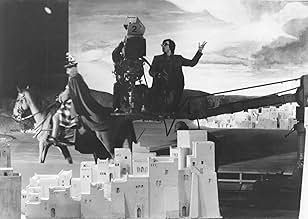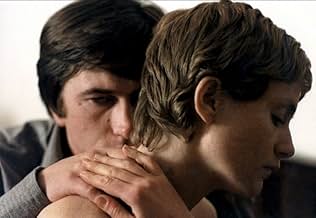Passion
- 1982
- Tous publics
- 1h 28min
NOTE IMDb
6,2/10
2,9 k
MA NOTE
Un réalisateur de film a une crise d'inspiration alors qu'il travaille sur la production, Passion, et se débat avec la nature du travail et de l'art.Un réalisateur de film a une crise d'inspiration alors qu'il travaille sur la production, Passion, et se débat avec la nature du travail et de l'art.Un réalisateur de film a une crise d'inspiration alors qu'il travaille sur la production, Passion, et se débat avec la nature du travail et de l'art.
- Récompenses
- 1 victoire et 5 nominations au total
Histoire
Le saviez-vous
- AnecdotesThe tableaux vivants filmed are: "The Night Watch" by Rembrandt; "The Parasol", "The Third of May 1808", "La Maja Desnuda" and "Charles IV of Spain and His Family" by Goya; "The Valpinçon Bather" and "The Turkish Bath" by Ingres; "Entry of the Crusaders in Constantinople" and "Jacob wrestling with the angel" by Eugène Delacroix; "Assumption of the Virgin" by El Greco; "The Embarkation for Cythera" by Watteau.
- ConnexionsEdited into Histoire(s) du cinéma: Une histoire seule (1989)
- Bandes originalesFrères humains, L'amour n'a pas d'âge
Written by Léo Ferré
Commentaire à la une
Passion was the kind of Jean-Luc Godard picture I would watch rather late at night, ironically enough, thinking of it and other works of his like digging into a good book as something fulfilling before conking out. There are things that make this effort quite reccomendable, albeit I'm not sure how I would react to it overall if seen again in the context of a sunny day and some more concentration going on. What remains striking, even when Godard was at his most slumming-it points in the 80s (and he had quite a few) are the images as done by a master of the camera. The opening shot is one of these, with the airplane far off in the sky letting out its white line of smoke, photographed to a classical composition playing in the background. It has a feel of the documentary, but the push of something more operatic in the meaning behind the image. This could go for what is most significant about the rest of the film, where- per usual as one of Godard's most love-hate subjects- cinema itself is dissected though what could be more like abstract documentary figures as characters.
The one asset to a film like Passion, at least in comparison to other works at this period for the filmmaker, is that there is at least something of a story going on, something that doesn't shut out a viewer entirely by the banality of overused semantics and images that end up evoking a disinterest in the distance of subject to viewer. There's even a couple of conversations one sees from time to time with the characters that go towards at least coherent and at best with a good edge at the struggles of film-making and the hassles of love, or half-hearted lust. The only problem then comes with some of this just being so experimental that it ends up closing off some viewers. I remember one segment that had the inklings of being a compelling scene, where Godard shows the filming within the filming (if it is that, maybe it isn't) of a period piece being filmed. There's many faces and narration going over each face and image, but one's attention (at least mine anyway) waxed and waned. This may or may not be Godard's fault; in fact, one of the points that Godard has in his main filmmaker character having to make a film on TV is how mixed forms of media can be sort of antithetical. But to say that there are more than a couple of scenes and moments that foreshadow Godard's decent into pure (un-captivating) self-indulgence in his later years is present, even amid the nudity and classical music.
The one asset to a film like Passion, at least in comparison to other works at this period for the filmmaker, is that there is at least something of a story going on, something that doesn't shut out a viewer entirely by the banality of overused semantics and images that end up evoking a disinterest in the distance of subject to viewer. There's even a couple of conversations one sees from time to time with the characters that go towards at least coherent and at best with a good edge at the struggles of film-making and the hassles of love, or half-hearted lust. The only problem then comes with some of this just being so experimental that it ends up closing off some viewers. I remember one segment that had the inklings of being a compelling scene, where Godard shows the filming within the filming (if it is that, maybe it isn't) of a period piece being filmed. There's many faces and narration going over each face and image, but one's attention (at least mine anyway) waxed and waned. This may or may not be Godard's fault; in fact, one of the points that Godard has in his main filmmaker character having to make a film on TV is how mixed forms of media can be sort of antithetical. But to say that there are more than a couple of scenes and moments that foreshadow Godard's decent into pure (un-captivating) self-indulgence in his later years is present, even amid the nudity and classical music.
- Quinoa1984
- 18 mai 2007
- Permalien
Meilleurs choix
Connectez-vous pour évaluer et suivre la liste de favoris afin de recevoir des recommandations personnalisées
- How long is Passion?Alimenté par Alexa
Détails
- Date de sortie
- Pays d’origine
- Langues
- Aussi connu sous le nom de
- Passion, le Travail et l'Amour
- Sociétés de production
- Voir plus de crédits d'entreprise sur IMDbPro
- Durée1 heure 28 minutes
- Mixage
- Rapport de forme
- 1.66 : 1
Contribuer à cette page
Suggérer une modification ou ajouter du contenu manquant




























